Discover fascinating and surprising bug facts with these Epic Bug Facts. From creepy crawlies to magnificent insects, explore a world of enthralling information about bugs that will leave you in awe. Learn about their unique characteristics, behaviors, and habitats in this exciting collection of bug trivia. Get ready to be amazed by the incredible world of bugs!
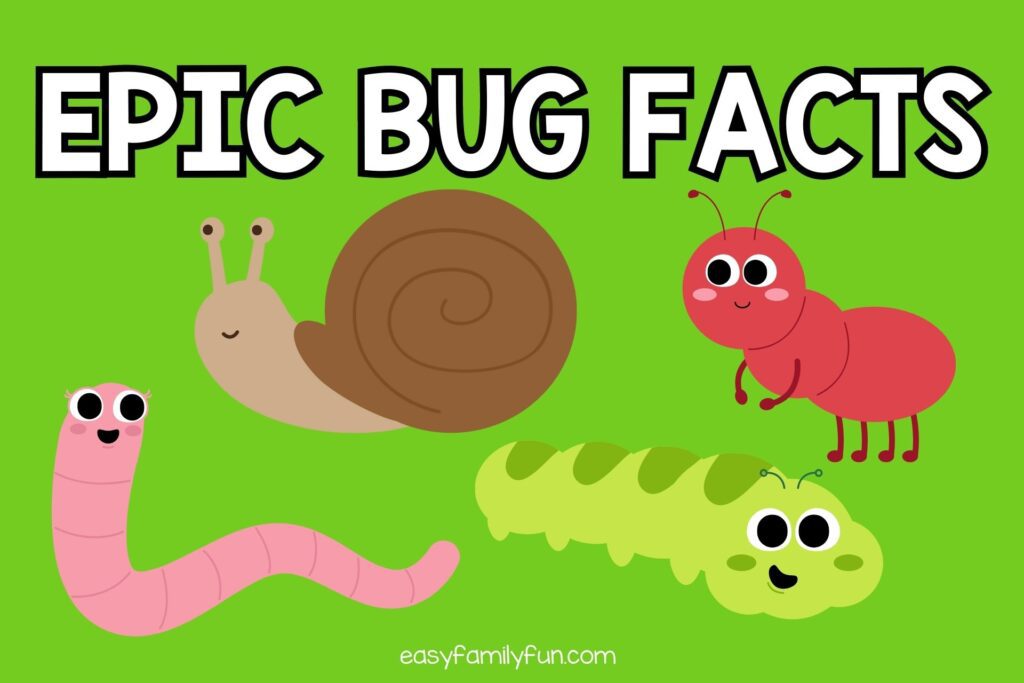
Whether you’re a curious kid, a bug-loving adult, or simply fascinated by the diversity of life on Earth, Epic Bug Facts is here to amaze and educate you with a treasure trove of bug-related knowledge. So, let’s dive in and discover the awe-inspiring realm of bugs like never before!
If you love learning about new facts be sure to check out our facts about butterflies, and facts about Spring!
Epic Bug Facts
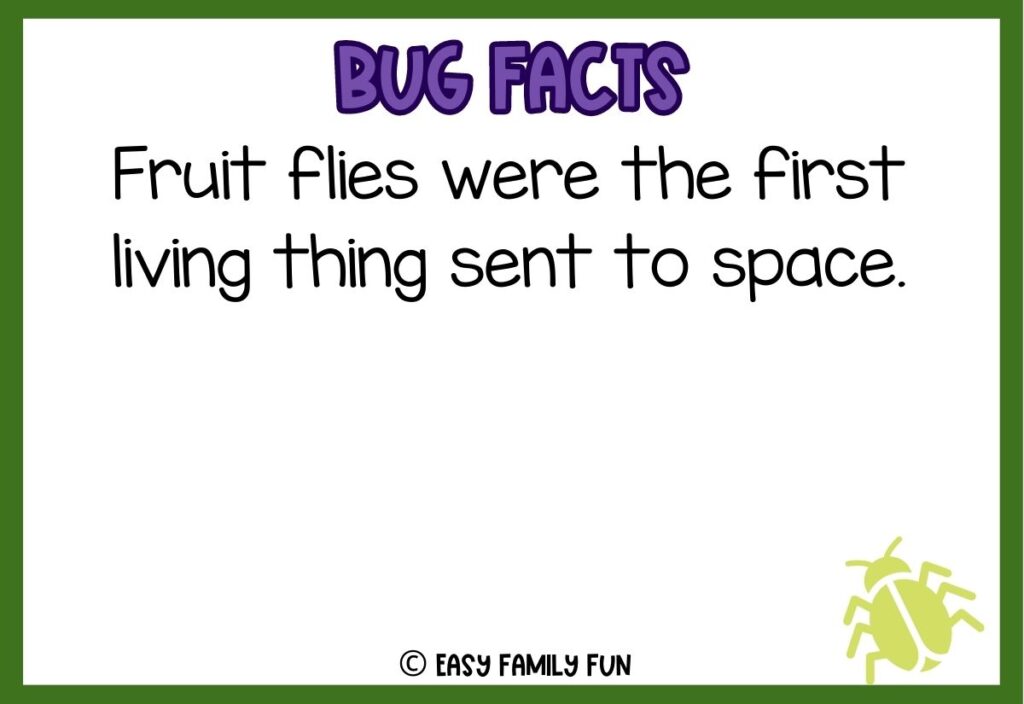
- Fruit flies were the first living thing sent to space.
- There are around 1,900 different species of edible bugs in the world.
- The type of bug commonly known as June bugs or lightning bugs are actually flying beetles.
- Houseflies find sugar with their feet.
- Termites like the vibrations from rock music.
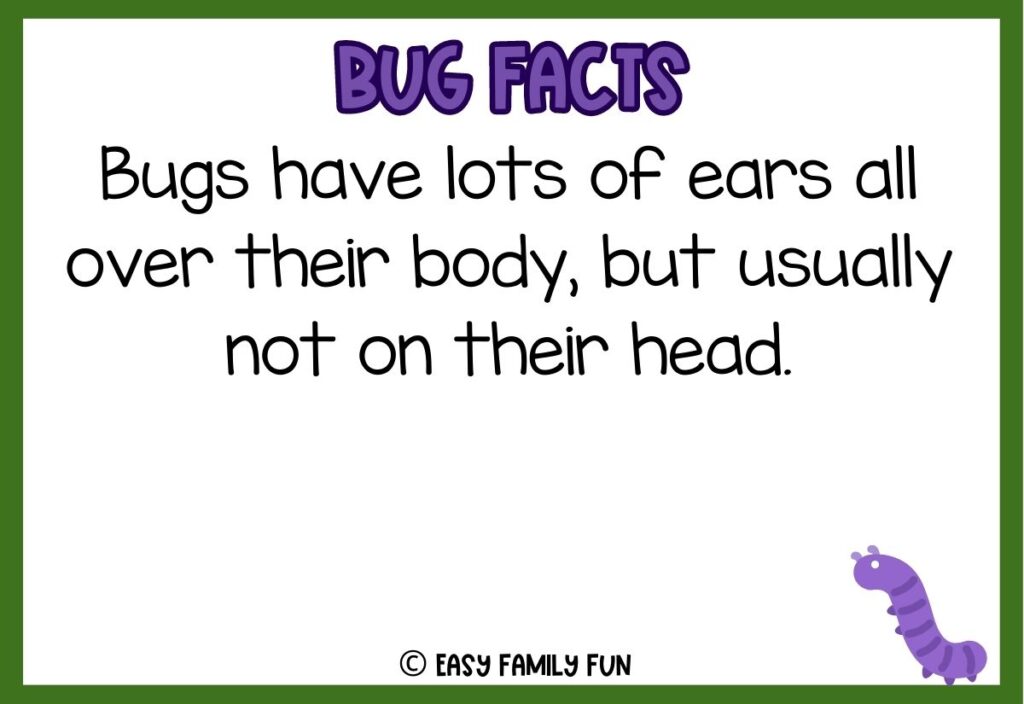
- Bugs have lots of ears all over their body, but usually not on their head.
- Ant colonies cannot reproduce without a queen ant.
- A type of wasp known as the Voodoo Wasp can turn caterpillars into zombies that help protect their babies.
- Jumping spiders can jump up to 50 times their own length.
- There are unique light patterns for every type of firefly.
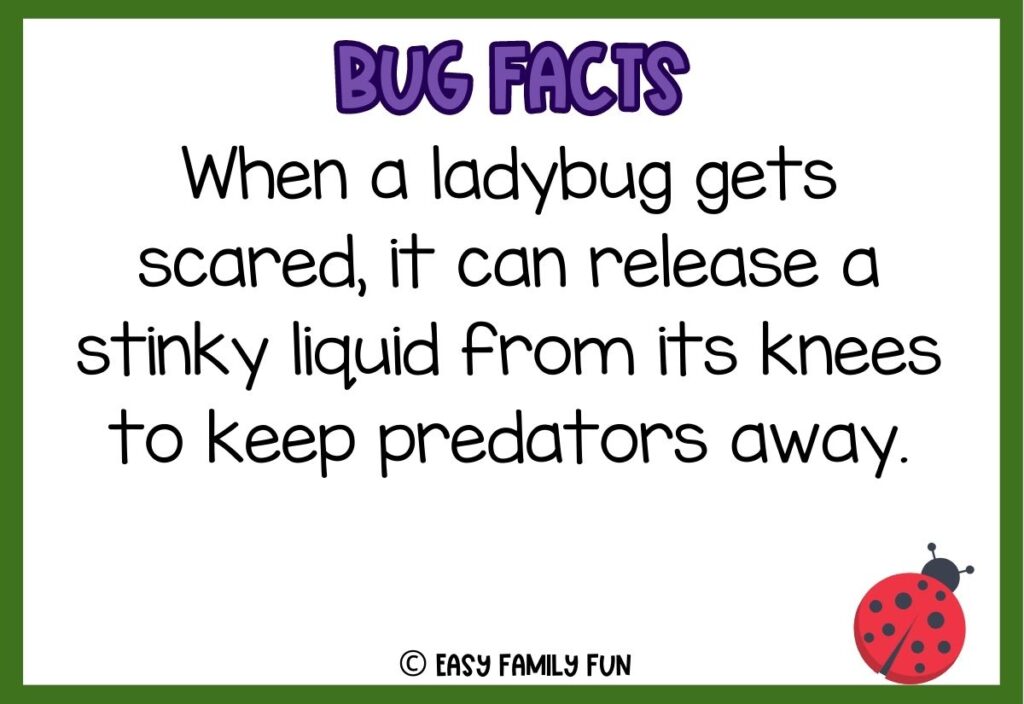
- When a ladybug gets scared, it can release a stinky liquid from its knees to keep predators away.
- The Australian Tiger Beetle is in the Guiness Book of World Records for being the fastest bug, running as fast as 5.6 miles per hour.
- Stick bugs can grow up to 2 feet long.
- All bugs are insects, but not all insects are bugs.
- Spiders are arachnids, not insects.
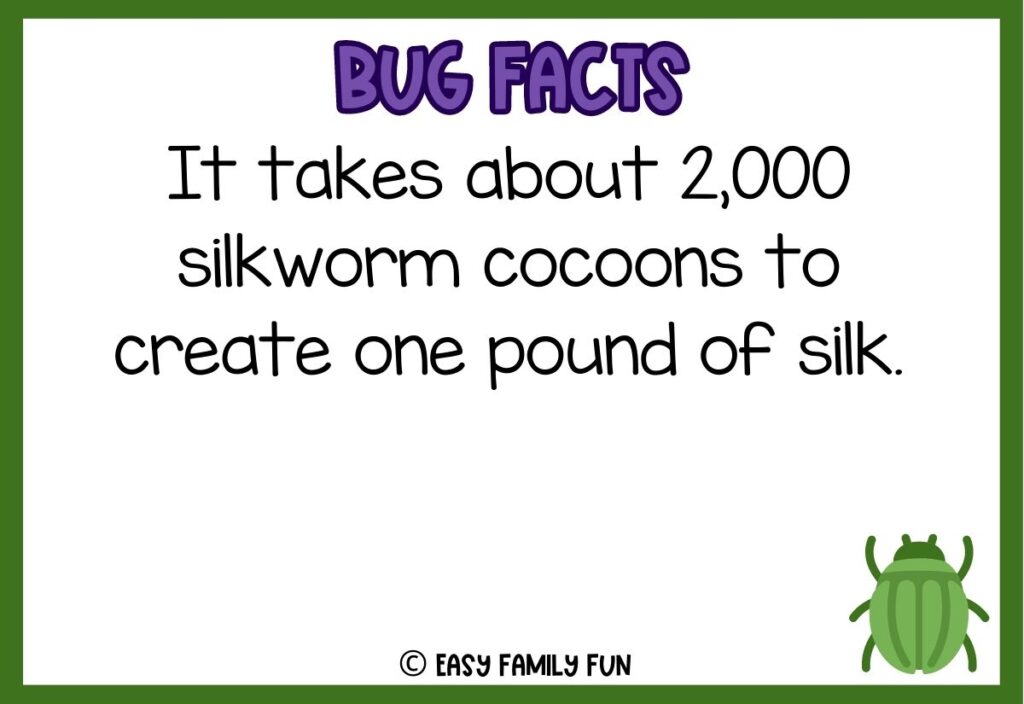
- It takes about 2,000 silkworm cocoons to create one pound of silk.
- The venom of a black widow is 15 times deadlier than rattlesnake venom.
- Hornets like to eat bees.
- A single bee only makes 1/12th a teaspoon of honey in its entire life.
- Jerusalem moths don’t chirp like other crickets.
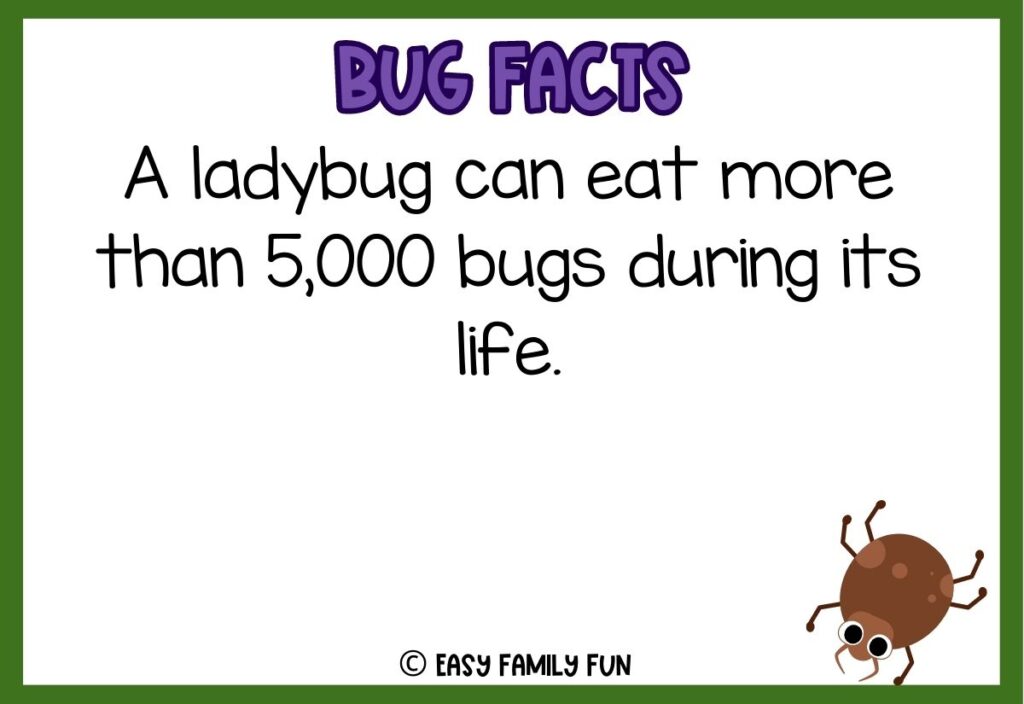
- A ladybug can eat more than 5,000 bugs during its life.
- Cicadas are some of the loudest singing insects in the world.
- Houseflies eat their own vomit.
- Praying mantises have triangle shaped heads.
- There are fungus gardens in the nests of leaf cutter ants.
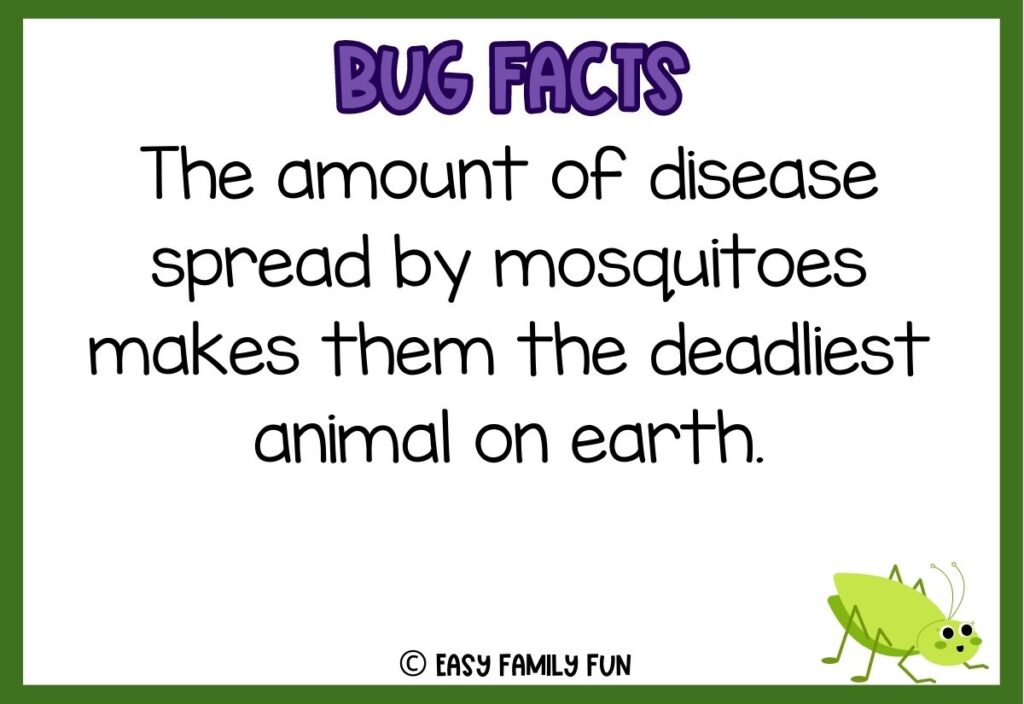
- The amount of disease spread by mosquitoes makes them the deadliest animal on earth.
- A dung beetle can drag things that are 1,141 times its own weight.
- Bee venom can be used to treat diseases like arthritis.
- Stink bugs like to find warm crevices in houses to stay in during the winter.
- Some types of ants can explode when attacked to protect their colony.
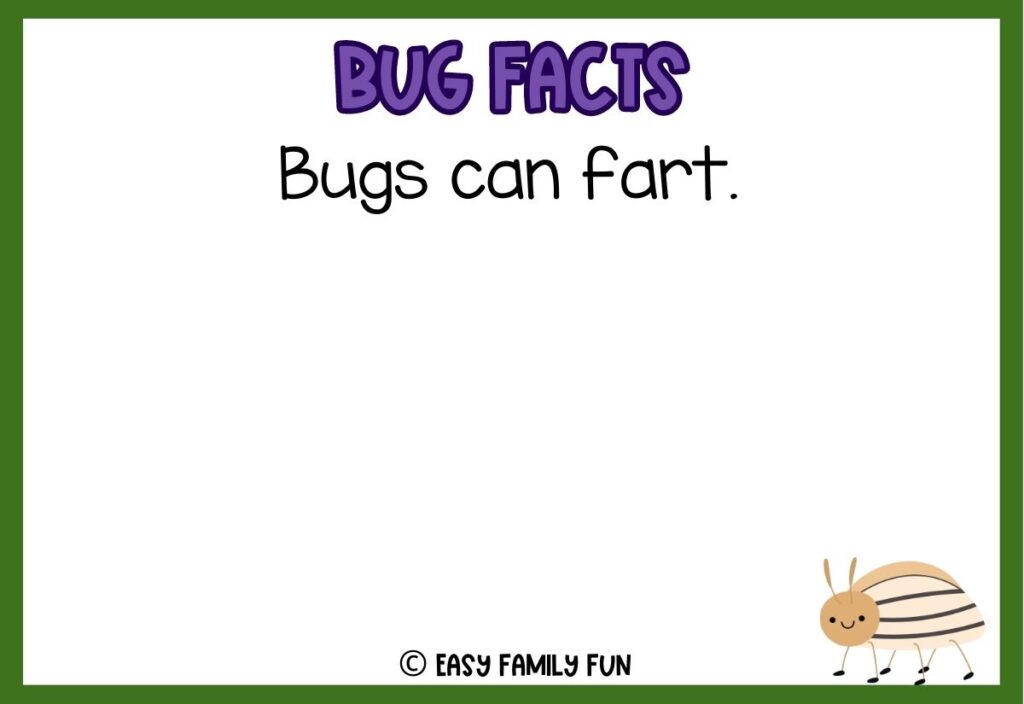
- Bugs can fart.
- There are 12 eyes on a caterpillar.
- Hercules beetles make a weird huffing sound when disturbed.
- The world has over 380,000 species of beetle.
- Insects make up 90% of all life forms on earth.
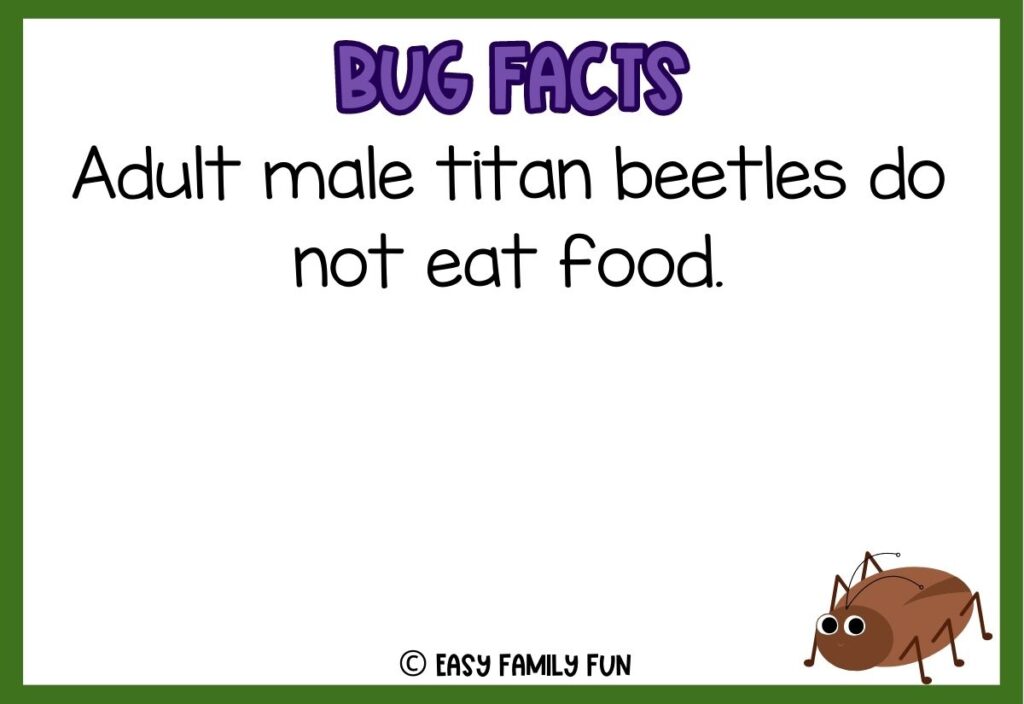
- Adult male titan beetles do not eat food.
- Adult bees have to teach little bees how to make honey.
- Bed bugs can ingest 7 times their own body weight in blood.
- Termite queens lay up to 40,000 eggs per day.
- Ladybugs are actually beetles, not bugs.
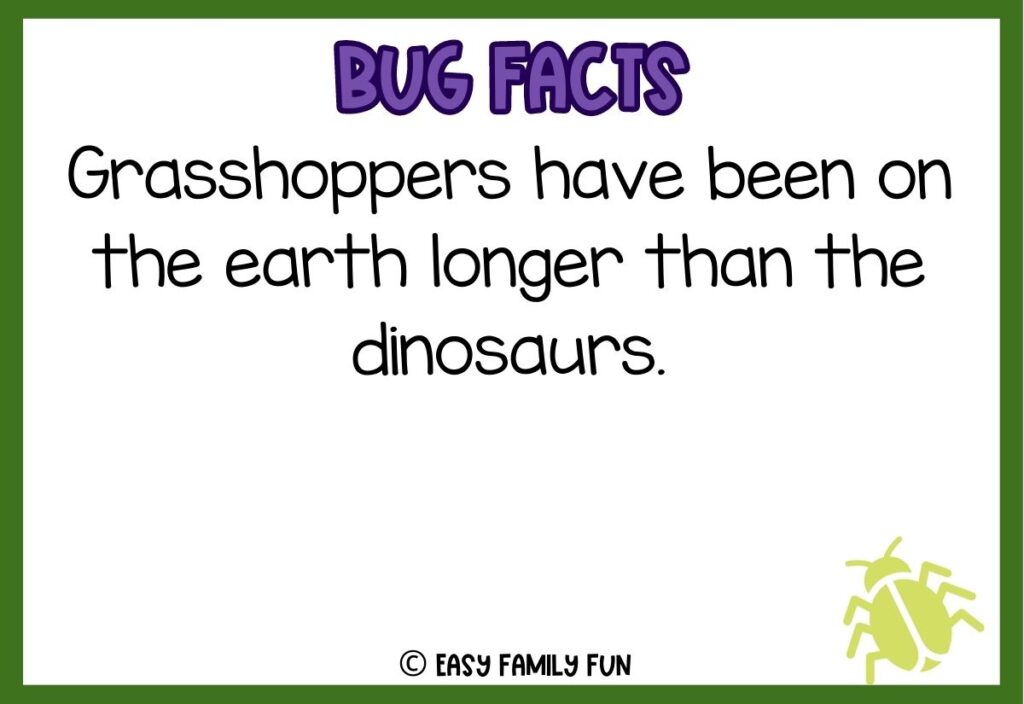
- Grasshoppers have been on the earth longer than the dinosaurs.
- The smell from your ears can attract bugs.
- Bed bug saliva has a mild anesthetic that makes it so their bites don’t initially itch.
- The smallest bug in the world is a parasitic wasp that is only 0.005 inches long.
- Praying mantises eat the head of their mate after they are impregnated.
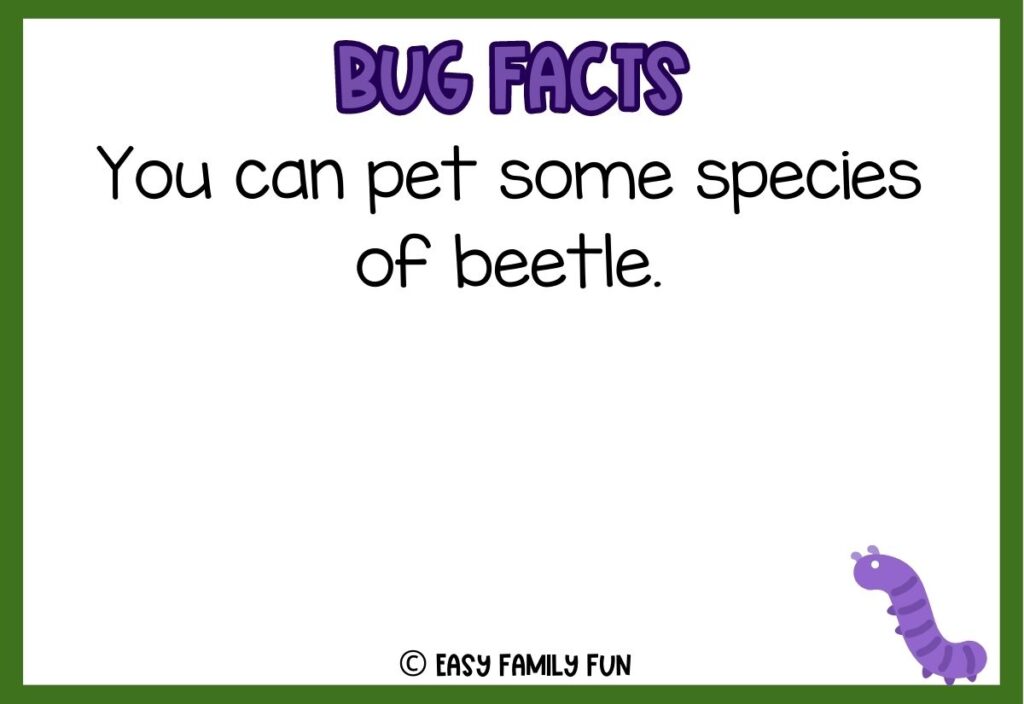
- You can pet some species of beetle.
- Ladybugs will play dead to avoid predators.
- The largest insect moth discovered in North America is the Goliath moth.
- Titan beetles are the largest kind of beetle that have been discovered.
- Katydids are like giant grasshoppers that look like leaves.
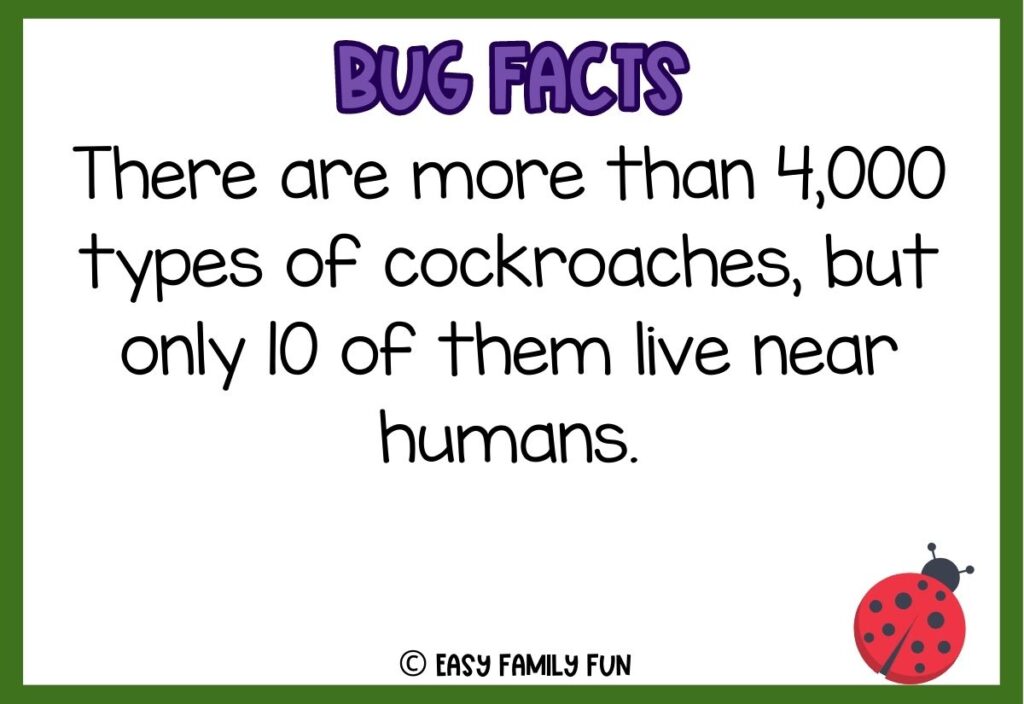
- There are more than 4,000 types of cockroaches, but only 10 of them live near humans.
- Some believe crickets can predict the weather.
- Young queen bees and reigning queen bees fight to the death to determine who will rule the colony.
- The largest bug to ever live was a prehistoric bug called the meganeuropsis, which looked like a dragonfly with 28 inch wings.
- Bed bugs are picky about only drinking blood from a live host.
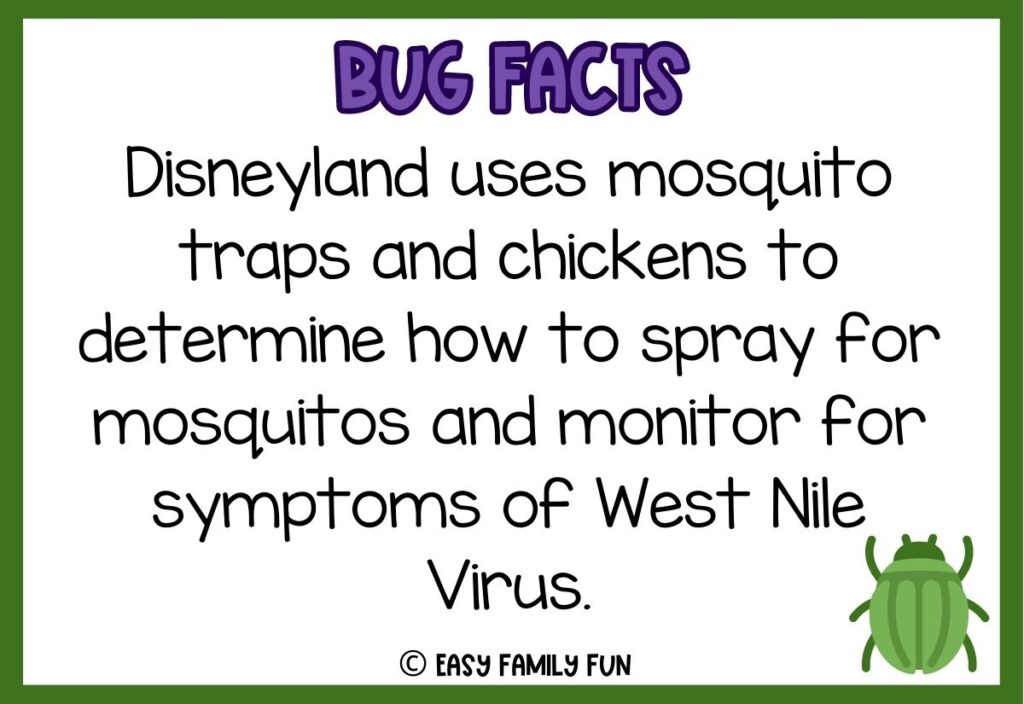
- Disneyland uses mosquito traps and chickens to determine how to spray for mosquitos and monitor for symptoms of West Nile Virus.
- Asian giant hornets produce a venom that dissolves human skin and attacks the nervous system.
- Seed pods that have had moth larva laid in them are called Mexican jumping beans.
- The Brahmin Moth Caterpillar looks like it should be an alien bug.
- There are ten species of Hercules beetle.
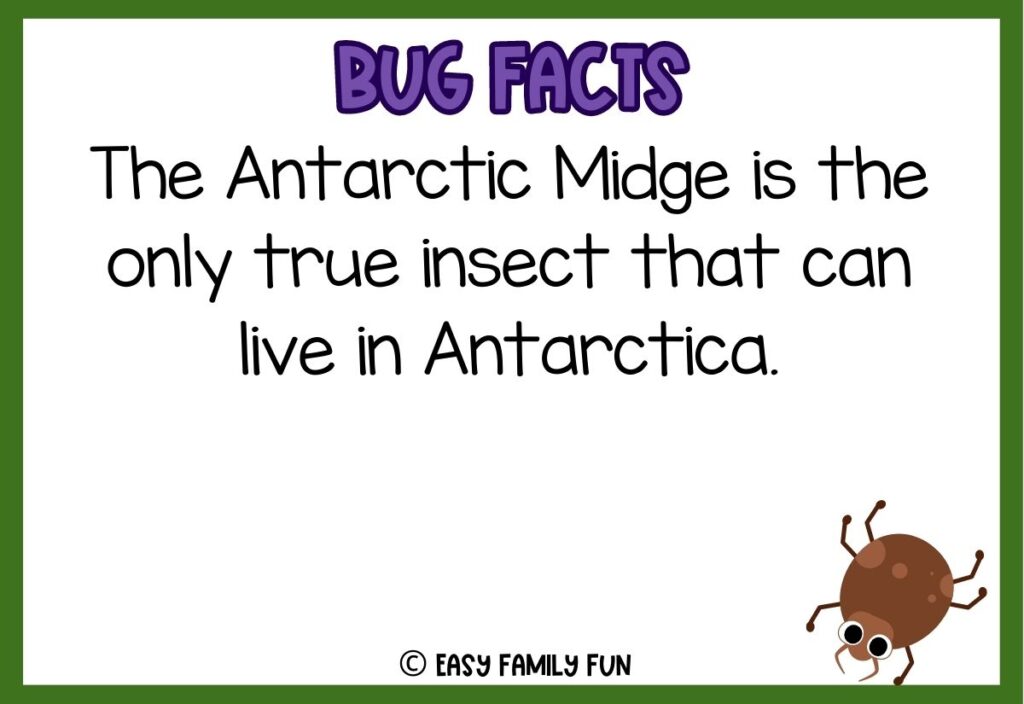
- The Antarctic Midge is the only true insect that can live in Antarctica.
- Mosquito wings flap as fast as 500 times a second.
- There’s a type of fly that produces sperm that is 20 times longer than itself.
- There are at least 30 insect fragments in every 100 grams of peanut butter.
- Queen bees toot or quack to rally worker bees on their side in their fight for dominion over the colony.
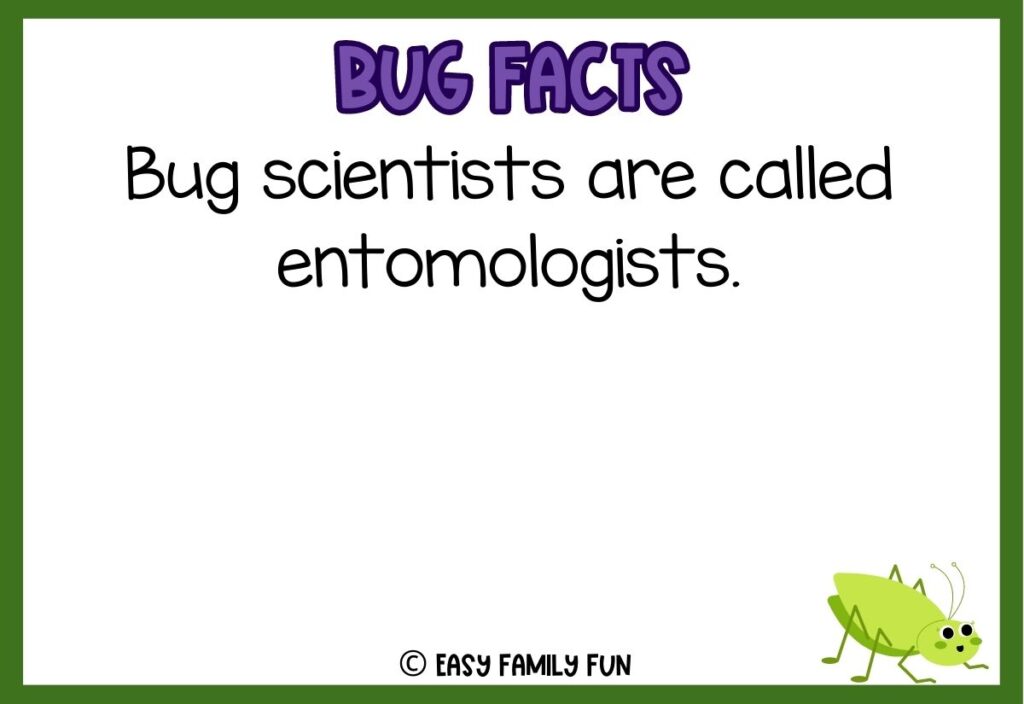
- Bug scientists are called entomologists.
- For a bug to be called an insect, it has to have a head, thorax, and abdomen with six legs, two antennae, a pair of compound eyes, and at least one pair of wings.
- Water boatmen beetles breathe through their butts.
- Black and yellow Asian swallowtail butterflies in their caterpillar stage can disguise themselves as bird poop to protect themselves from being eaten.
- Leaf bugs, also known as Phylliidae bugs, look like walking leaves.
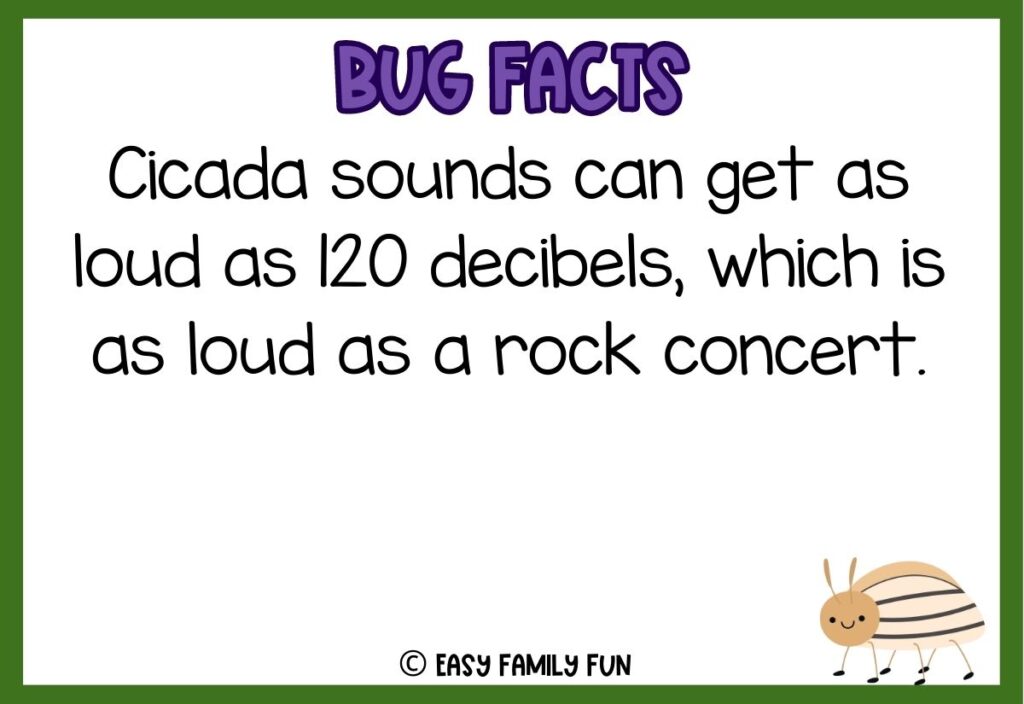
- Cicada sounds can get as loud as 120 decibels, which is as loud as a rock concert.
- Praying mantises are related to termites and cockroaches.
- Ladybugs are also called ladybirds.
- Insects have been around on the earth for approximately 350 million years, in comparison humans have only been on the earth for about 300,00 years.
- Damselflies have been on the earth for 300 million years.

- There are more than 2,400 different types of praying mantises.
- People who love bugs are called entomophiles.
- A honey bee colony can produce up to 100 pounds of honey every year.
- Bugs can’t live in the ocean, but they can breathe underwater.
- Flies have multidirectional genitals that allow them to mate at any angle.
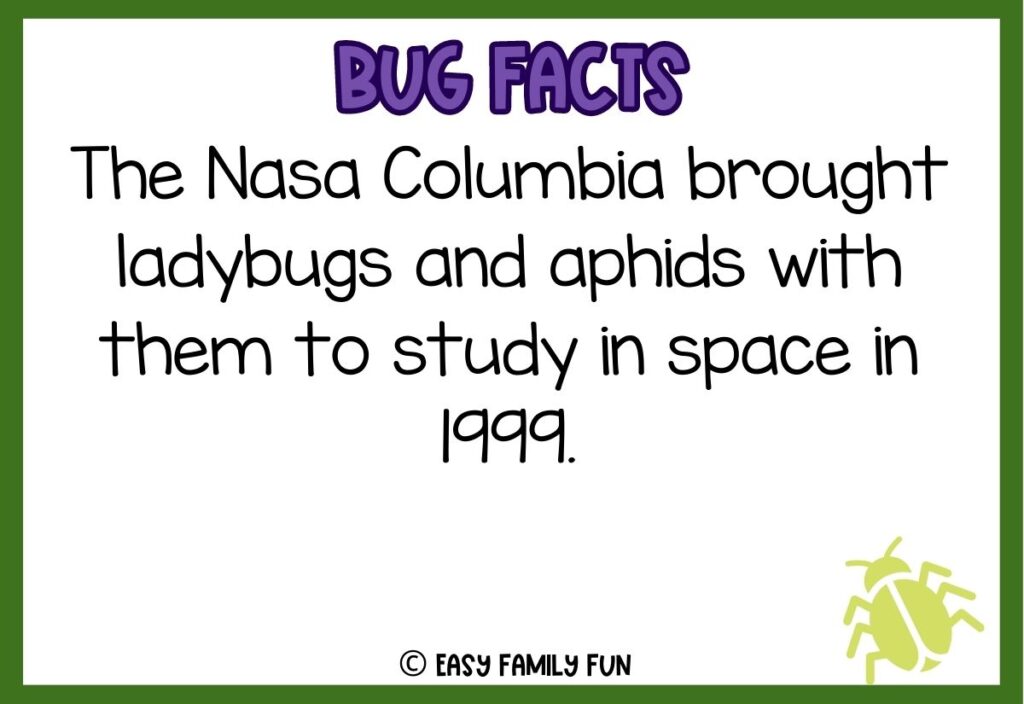
- The Nasa Columbia brought ladybugs and aphids with them to study in space in 1999.
- Mosquitoes like smelly feet.
- There are around 1.5 million different kinds/species of insects in the world.
- Every continent except Antarctica has bees.
- Male Red Velvet Mites create love gardens to attract female mates.
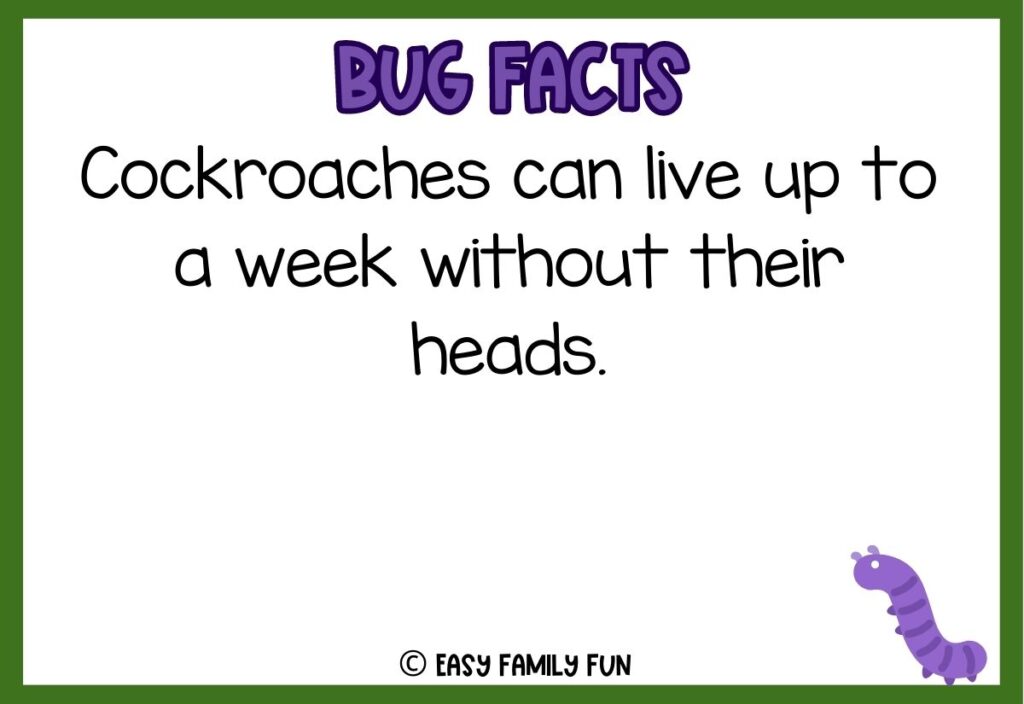
- Cockroaches can live up to a week without their heads.
- Ant-eating assassin bugs scares predators off by piling its victims on top of itself.
- Flies are used to help solve crimes.
- Stoneflies use push-ups as part of their mating dance.
- Air pollution can make bees, butterflies, and moths confused so they can’t pollinate as many flowers.
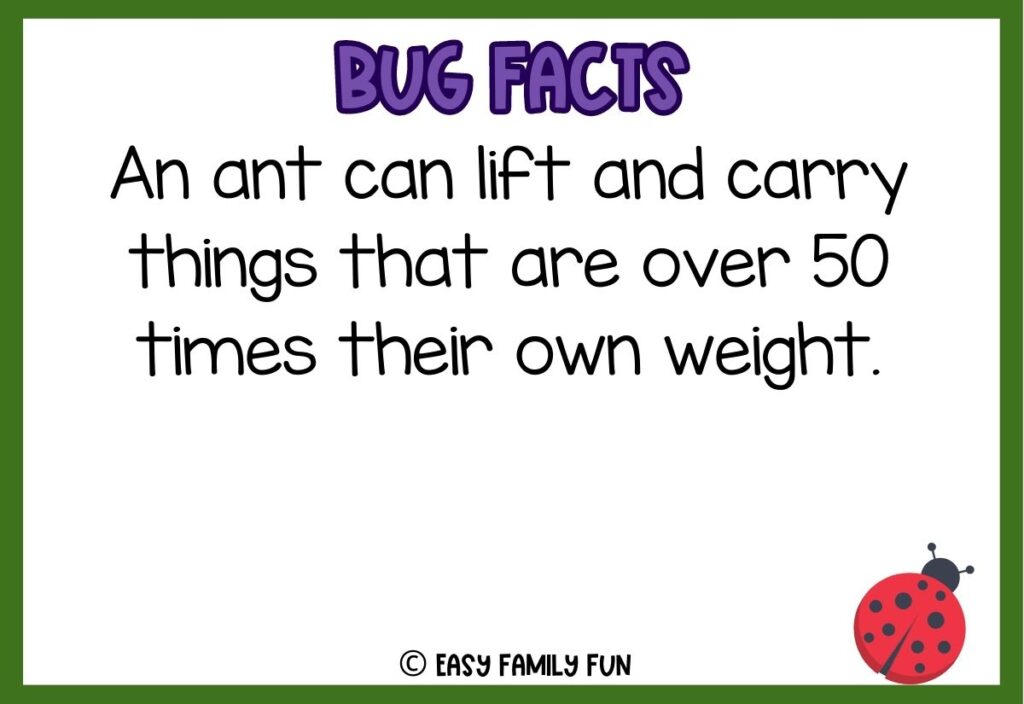
- An ant can lift and carry things that are over 50 times their own weight.
- Ladybugs can help protect your garden from fruit flies and mites.
- Some bugs can breathe underwater.
- Insects are cold-blooded.
- Tiny arachnids live in the wings of Harlequin Beetle bugs.
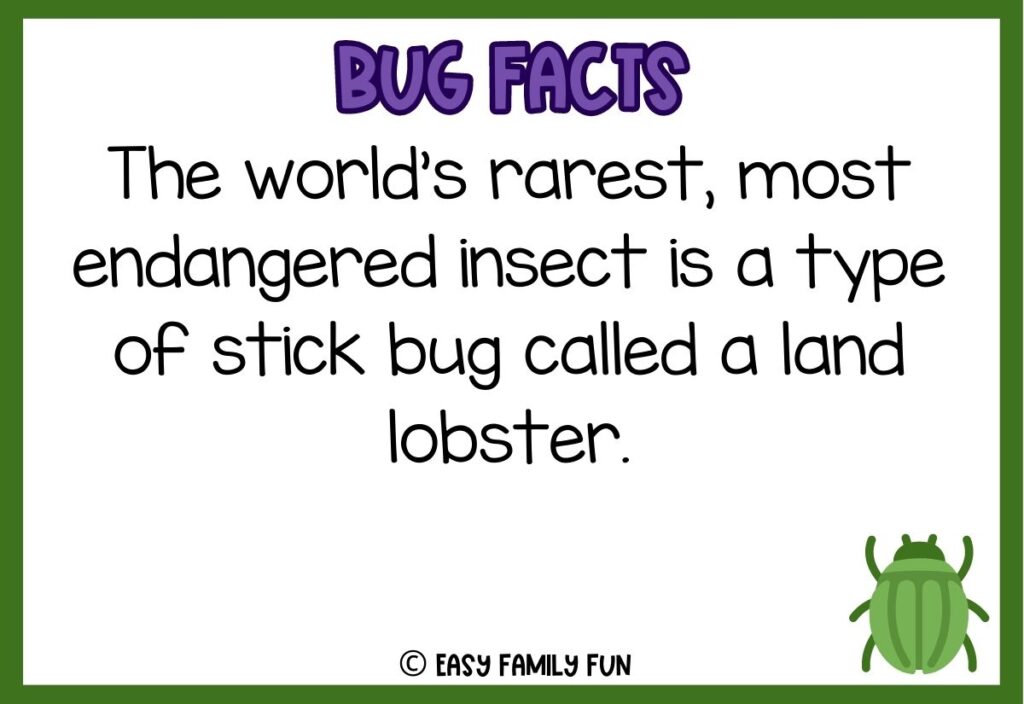
- The world’s rarest, most endangered insect is a type of stick bug called a land lobster.
- Male wasps fight off frogs using their genitals.
- A bee can fly up to 60 miles a day in their daily search for food.
- Wasps can get drunk on fermented juice.
- Wax moth caterpillar spit can break down plastic waste.
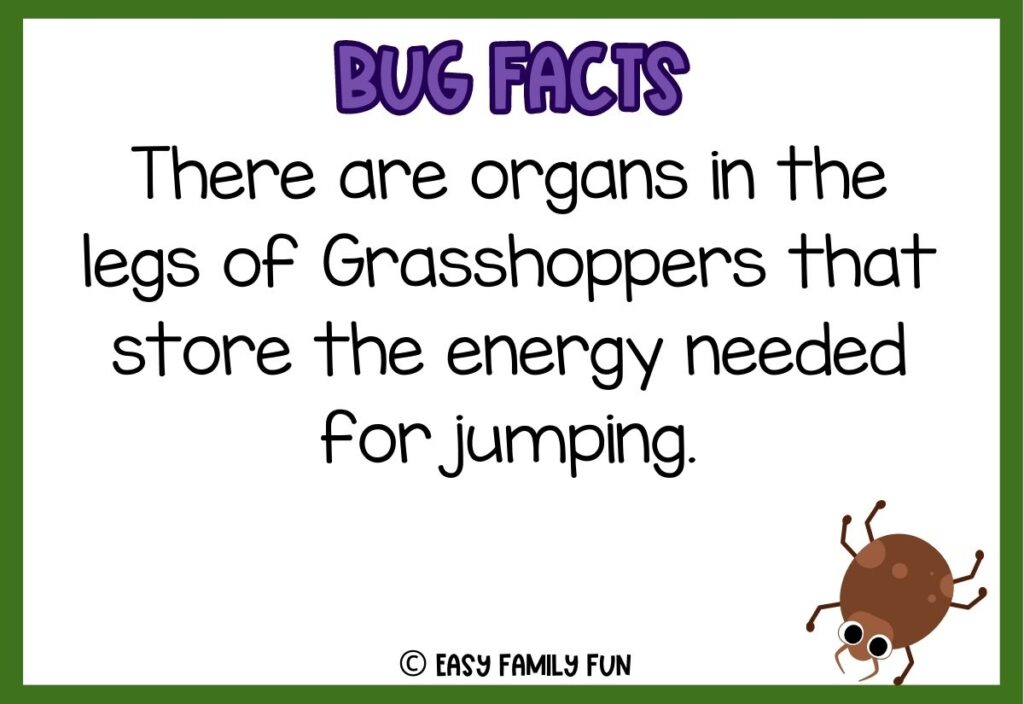
- There are organs in the legs of Grasshoppers that store the energy needed for jumping.
- Male moths can smell female sex hormones for miles even though they don’t have noses.
- Crickets make chirping sounds with their legs.
- Caterpillars have more muscles than humans.
- Ants swap spit to help each other live longer.
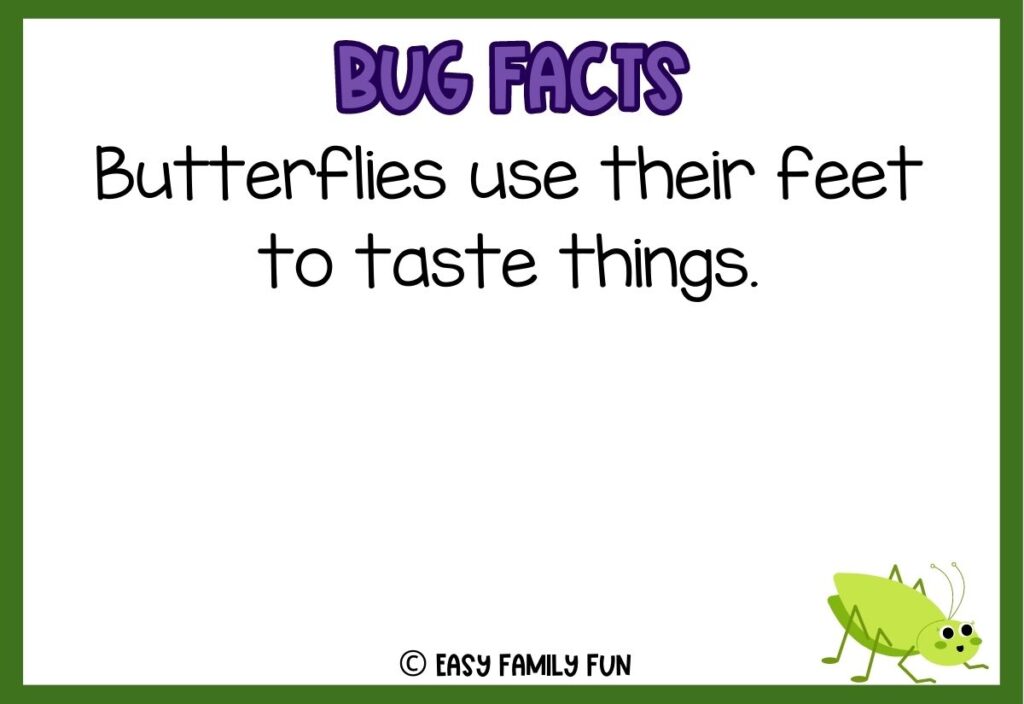
- Butterflies use their feet to taste things.
- Praying mantises are the only insect with stereo vision.
- Japanese beetle bugs scare away predators by lifting their legs to scare them off.
- There is a species of wasp with blue wings.
- Bulldog ants can leap at least 7 times their own body length.
Do you know another other epic bug facts? Be sure to put them in the comments!
Are you looking for more fun and engaging facts to share with your family? Check out these other posts for more facts!
- 100 Fascinating Facts about Mexico
- 75 Fascinating Facts About France
- 100 Purr-fectly Delightful Facts About Cats
- 87 Fascinating Facts About Owls
- 103 Super Cool Facts About Space
- 100 Interesting Facts About Hurricanes
- Facts About the 9/11 Memorial
- Facts About Spring
- Facts About Rosa Parks
- 50 Fascinating Facts About Butterflies
- 50 Fascinating Facts About Eagles
- Facts About Rome
- Facts About Lions
- Facts about Big Ben
- 100 Best Facts About Quartz for Kids
- 100 Best Facts About Cheese For Kids
- 100 Best Facts About Canada for Kids
- 100+ Out-of-This-World Facts about Earth
- 100 Epic Bug Facts for Kids
- 100 Weird Facts About Animals for Kids
- 85 Stellar Facts About Jupiter
- 135 Fascinating Facts About Ireland That Will Make You Fall in Love
- 50+ Interesting Facts about the Nervous System [Fact Cards]
- 55 Interesting Facts About Seattle [Free Fact Cards]
- 55 Best Facts about Frogs [Free Fact Cards]
- 66 Best Facts About Blueberries [Free Fact Cards]
- 37 Best Facts About Bacon [Free Fact Cards]
- 65 Best Facts About Comets [Free Fact Cards]
- 85+ Best Titanic Facts [Free Fact Cards]
- Interesting Facts about Ladybugs [Free Fact Cards]
- Abraham Lincoln Facts You Should Know [Free Fact Cards]
- Dive Into These Facts About Jellyfish [Free Fact Cards]
- Interesting Banana facts [Free Fact Cards]
- 20 Interesting Facts About Red Wolves [Free Fact Cards]
- Mt. Rushmore Facts: Carving History in Stone [Free Fact Cards]
- 66 Best Facts About Blueberries [Free Fact Cards]
- Over 100 Fun Facts about North Carolina [Free Fact Cards]
- 79 Electrifying Facts about Lightning [Free Fact Cards]
- 56 Interesting Facts About Snakes [Free Fact Cards]
- 56 Interesting Facts About Snakes [Free Fact Cards]
- 53 Fascinating Facts about Spiders [Free Fact Cards]
- 74 Interesting Facts About New Zealand [Free Fact Cards]
- 50 Interesting Facts About Apples [Free Fact Cards]
- 100 Purr-fectly Delightful Facts About Cats
- Buzzing with Knowledge: Explore 65 Fascinating Facts About Bees!
- 100 Marvelous Facts About Monkeys
- Gallop Through Knowledge: With These 75 Fascinating Facts about Horses
- Travel Back in Time With These Facts About the 13 Colonies!
- 52 Facts About Neptune for the Future Astronauts in Your Family
- 40 Incredible Facts About Your Heart
- 25 Remarkable Facts about James Madison
- 35 Oink-some Facts About Pigs
- 50 Neck-Stretching Facts about Giraffes
- 65 Patriotic Facts about the Statue of Liberty
- 50 Incredible Facts About Turtles
- 40 Mischievous Facts About Raccoons
- 135 Fascinating Facts About Ireland That Will Make You Fall in Love
- 85 Stellar Facts About Jupiter
- 100 Weird Facts About Animals for Kids
- 100 Epic Bug Facts for Kids
- 100+ Out-of-This-World Facts about Earth
- 100 Best Facts About Canada for Kids
- 100 Best Facts About Cheese For Kids
How Do I Print A PDF?
You’ll need a program that supports PDFs. Adobe Acrobat is a great option. Open the program, click file, then print. Select your printer and the number of copies you want to print. Be sure you click double-sided if you want it to print on both sides.
Can I Resell These?
You may not resell any printable that you find on our website or in our resource library. You may use them for class parties, at church, at home, or in the classroom. You may get these printed at an office supply store or copy center at your own expense.
